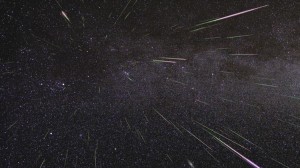Jupiter Amps Up Perseid Meteors
August 11, 2016
It is going to storm tonight—but don’t worry, you won’t get wet. The Perseid meteor shower peaks in the evening hours tonight and early tomorrow morning. Sky watchers in the Northern Hemisphere may be able to see bright streaks flashing across the night sky. Thanks to the mighty influence of the planet Jupiter, the Perseids are more numerous than they’ve been for several years.
Meteor showers occur when Earth travels through a stream of meteoroids. A meteoroid is a piece of matter that enters Earth’s atmosphere at a high speed. The rate at which meteors appear generally increases, peaks, and then decreases as Earth moves in and out of a stream. As seen from the ground, all meteors in a particular shower appear to come from the same direction in the sky. This direction is called the radiant of the shower.
The Perseids are an annual meteor shower caused by a dusty trail of debris left by Comet Swift-Tuttle. As the comet orbits the sun, it sheds rock and dust particles. As Earth travels through this ring of debris, meteoroids crash into the atmosphere. Their high speed heats up the air, causing it to glow. Almost all these meteoroids are too small to reach Earth’s surface and instead burn up in the atmosphere. The Perseids get their name because the radiant of the shower lies near the constellation Perseus.
Comet Swift-Tuttle leaves a wide swath of debris, so meteors have been visible for several weeks already and should be visible for several more. The frequency of meteor sightings is expected to peak tonight, however, as Earth passes through the thickest part of the debris cloud. Astronomers estimate that there may be as many as 200 visible meteors per hour! What’s the reason for this abnormally heavy shower? The intense gravity of Jupiter sometimes tugs at debris streams left by comets. In the case of this year’s Perseids, Jupiter has pulled the center of the stream closer to Earth’s orbit, nearly doubling the usual meteor shower.
Look toward Perseus tonight after sunset to catch the show (it is best seen when the constellation is directly overhead). If possible, get away from urban light pollution, but some shooting stars can be seen even near a city’s glow. Astronomers think the brightest meteors may even outshine the stars tonight—for only a fraction of a second, of course!
Other World Book articles:



